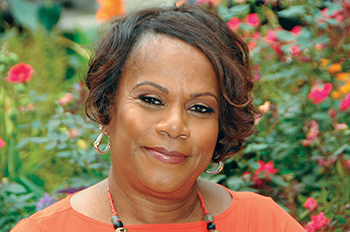Voting Matters at all Levels, Including NASW Elections
From the President
By Mildred “Mit” C. Joyner, DPS, MSW, LCSW

Stacey Abrams was recently nominated for a Nobel Peace Prize for her efforts to get out the vote and champion a fraternity between all people for a peaceful and just society.
Abrams said, “Full citizenship rights are the bare minimum one should expect from the government. Yet, for two-thirds of our history, full citizenship was denied to those who built this country from theory to life. African slaves and Chinese workers and Native American environmentalists and Latino gauchos and Irish farmers—and half the population: women. Over the course of our history, these men and women, these patriots, and defenders of liberty, have been denied the most profound currency of citizenship: power. Because, let us be honest, that is the core of this fight. The right to be seen, the right to be heard, the right to direct the course of history are markers of power. In the United States, democracy makes politics one of the key levers to exercising power. So, it should shock none of us that the struggle for dominion over our nation’s future and who will participate is simply a battle for American power.”
Over the last several months, the United States witnessed yet another attack on our democracy. After the Jan. 6 insurrection attempt on the U.S. Capitol, many elected officials joined forces to suppress the right to vote. To deny citizens the right to vote violates the U.S. Constitution, Amendment XV (1870) which states: Section 1. The right of citizens of the United States to vote shall not be denied or abridged by the United States or by any State on account of race, color, or previous condition of servitude. Section 2. The congress shall have power to enforce this article by appropriate legislation.
Thirty-three states have proposed at least 250 laws to suppress the right to vote. We know that if enacted, these state policies will significantly impact the vote of those we serve. We should reread the NASW Code of Ethics and commit to action against all bodies that attempt to suppress the vote, because social workers have an ethical responsibility to the broader society.
As social workers, we affirm that all eligible people have the right to vote in all elections. We can model this behavior by also voting in NASW elections.
Voting is one of the most important duties and responsibilities of membership. How can we ask members of our communities to vote when we fail to vote for candidates in our professional association elections?
Those who are elected to the NASW board have significant power. The NASW elected board of directors of the Association shall exercise all the powers of the Association, decide on policy and priorities, policy implementation, and the equitable allocation of financial resources under the broad policy and priority guidelines established by the membership of the Association in the meetings of the Delegate Assembly, as per the NASW bylaws.
Each year, the percentage of members who actually vote remains significantly low. With your help, we can change that trajectory and work together to increase the number of those who actively participate and vote in all NASW elections.
As Stacey Abrams reminded us, voting does matter in every level of governance—and voting for the leaders of NASW is no different. The members of the NASW National Committee on Nominations and Leadership Identification (NCNLI), chaired by KellyAnn Frazier, carried out its responsibilities and nominated a slate of qualified candidates.
NASW will promote candidates who are running for NASW board positions on social media platforms throughout the months of April and May and send out reminder notifications to vote. I humbly ask that you take the next step as members to read the candidates’ statements and do whatever is necessary to inform your vote—and then vote.
Let us commit to elect the next talented leaders of the NASW board. The 2021 ballot includes positions for vice president, treasurer, BSW student member, and regional members for Region III (New York State), Region IV (Ohio, Pennsylvania), Region VI (Delaware, Maryland, New Jersey), Region VIII (Indiana, Michigan, Wisconsin), and Region IX (Illinois, Iowa, Minnesota). Voting begins on April 6 and will end on May 28.
As we move forward, together, let’s take action to stop voter suppression wherever it exists. Together, let’s mobilize to ensure that all people are guaranteed the right to vote and have access to do so. Together, social workers will hurdle the obstacles that block liberation of all people.
Contact Mit Joyner at president@socialworkers.org